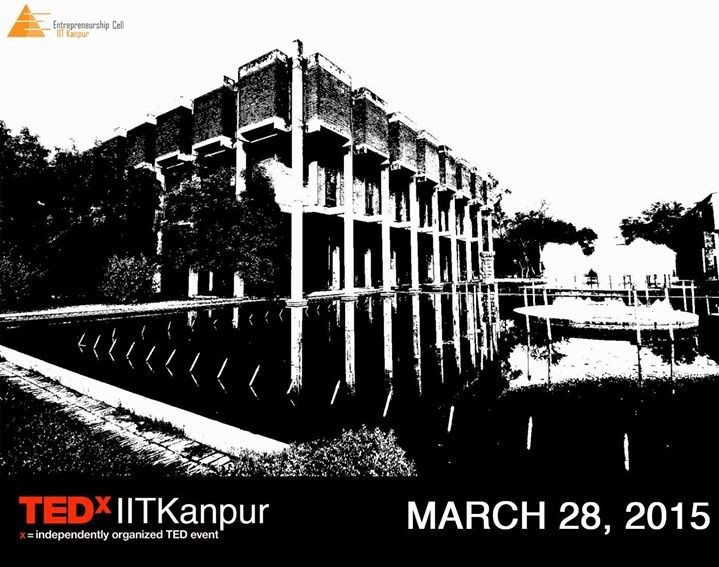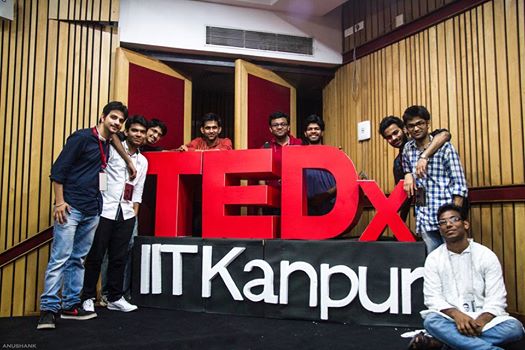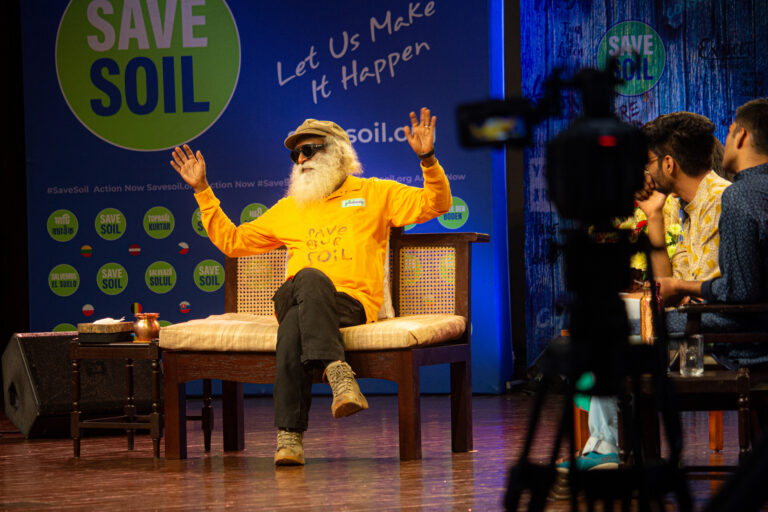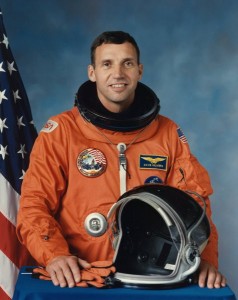TED is a global non-profit organization, which aims to promote sharing of ideas in diverse disciplines of life, ranging from business to technology to global issues and a lot more. TEDx are independently held TED events organized to help spreading ideas in communities across the world. TEDx IIT Kanpur is one such event conducted by Entrepreneurship Cell, IITK on an
annual basis.
The event began with the lighting of the lamp by Dr. B.V. Phani, coordinator of SIDBI Innovation and Incubation Centre, and Prof. Indranil Manna, Director, IIT Kanpur. This was followed by the
Director’s speech, in which he stressed the importance of innovation, and how we should all strive to create something new. In his own words, “In the recent years, we are extremely keen on pursuing innovation that leads to entrepreneurship”.
The first speaker of the evening was Abhijeet Awasthi, former National Creative Director of Ogilvy and Mather, India. He began by telling the audience about his adventures in life before moving on to advertising.He left us gaping when he showed some of the ads that have been his brainchildren – one of those was that of fevicol. The idea that he shared was that of thinking of ideas. Being in advertising for such a long time, he was used to ideation and using creativity to market products and services. He shared his algorithm of coming up with ideas that work: take an observation from life, use your imagination and you have the idea. He went on to show us the “seat belt crew” ad, where transgender people were urging the automobile drivers to use seat belts.
The next speaker was Amit Deshwal. He is an IITM alumnus of 2008, who quit his job at World Bank a year later to understand the meaning and forms of education and start a learning space for children that is different from formal teaching. He shared his agony about children of ages 2-3 years old being asked to join a formal school and be subjected to a regimented form of learning, where they are not even asked what or how they want to learn.He has traveled through different parts of India for nearly three years, trying to understand the different styles of learning. This, he said, opened his mind to various aspects of the same. He narrated an experience of his when he had stayed with his grandmother for a month and a half in a village after his grandfather had passed away. He had understood that people learn those things very quickly which they need to, but most people have internalized the fact that learning happens only in schools and colleges, although they know quite a lot about the world around them. “Present education system is destroying the diversity of life on Earth.” He went on to tell the audience about Palak, a girl who he had met at Ladakh, and how she benefitted from an open school.
The next man to take the stage was Aabid Surti, a national award winning author, artist, playwright and cartoonist. He started off by telling the audience that his initiative, Drop Dead, had saved 6 million liters of water single handedly. Surti told us about the kind of water scarcity that he and his family had to go through when he was a child, which was also the story of many rural and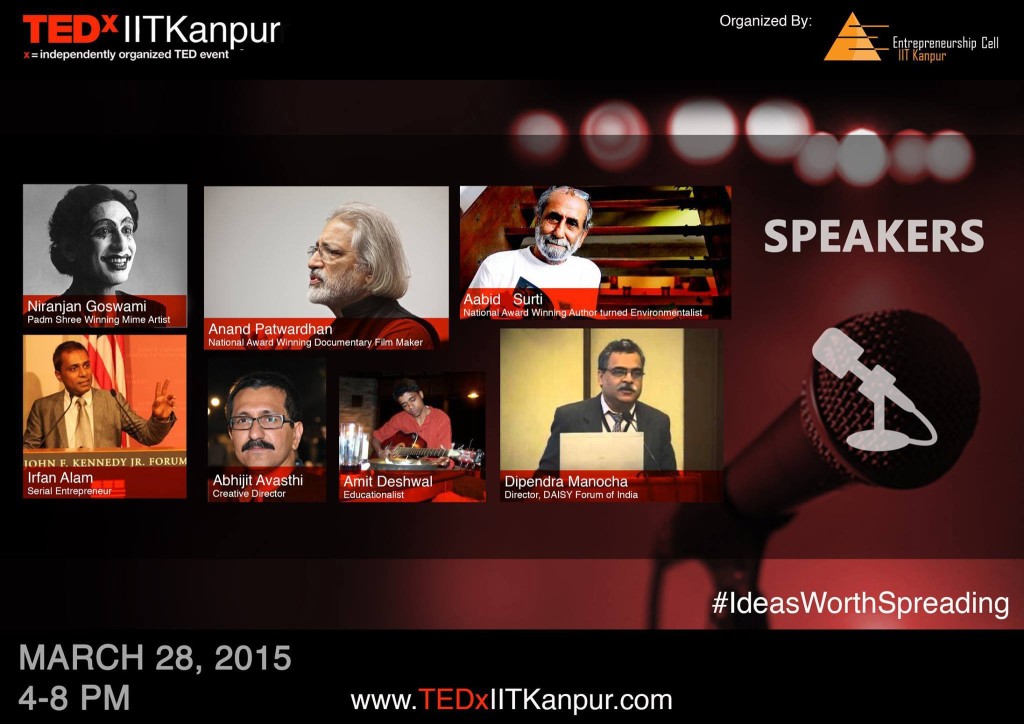 semi urban households at that time. Thus, he felt concerned about the voluminous wastage of water in households due to leaking taps. So he decided to tackle the problem head-on. He, along with a plumber and a female volunteer, started visiting houses every Sunday and fixing their leaking taps. He told us of his method – he took permission from the landlord of a housing society on a Monday and put the “Drop Dead foundation” poster on the notice board of the society. On Saturday, he would deliver a pamphlet in each house of the society with help from the watchman. Finally, his small team would visit the place on Sunday and fix all leaky taps. He then encouraged the audience to also indulge in such social service. He emphasized the fact that there are numerous problems in the world around us that need to be solved, and such acts of kindness can vastly improve the world that we live in.
semi urban households at that time. Thus, he felt concerned about the voluminous wastage of water in households due to leaking taps. So he decided to tackle the problem head-on. He, along with a plumber and a female volunteer, started visiting houses every Sunday and fixing their leaking taps. He told us of his method – he took permission from the landlord of a housing society on a Monday and put the “Drop Dead foundation” poster on the notice board of the society. On Saturday, he would deliver a pamphlet in each house of the society with help from the watchman. Finally, his small team would visit the place on Sunday and fix all leaky taps. He then encouraged the audience to also indulge in such social service. He emphasized the fact that there are numerous problems in the world around us that need to be solved, and such acts of kindness can vastly improve the world that we live in.
This was followed by a break for thirty minutes. Everyone had snacks, and the audience also got an opportunity to interact with the speakers informally and get to know their ideas better. At about 6.20, all were seated back again, and the fourth speaker, Dipendra Manocha, took the stage.
Dipendra Manocha is working as the developing countries coordinator and Lead of Training and Tech Support with the DAISY Consortium. He told us some of the incidents which made a major impact on his thinking and how he went on to do what he did afterwards. He couldn’t read or write – he always needed someone else to read out to him, and that is how he did his education. He was then introduced to a talking computer, which influenced him to start his education again, and make things accessible to the blind, so that they can get the most out of technology. He laid stress on the need for the blind to live their lives in a similar manner to the so-called “normal” people. He feels that there is a need for literary texts to reach the blind when it’s their time, and not when they are old and outdated.
After this captivating talk, next to come on stage was Irfan Alam, an internationally acclaimed entrepreneur. He began with this statement, “I’m going to share my frustration with you.” He continued by asking some rhetorical questions which were aimed to make the audience think about how particular we are about our possessions. The one question that troubles him is, “Why don’t we want the best country?” The idea that Alam shared was to take ownership of our country. Crimes, disabilities, poverty – all flourish here, because we aren’t accountable. Then, he made us close our eyes and reflect – to imagine a world that we own. In such an ideal scenario, how would we want our country to look like?
This thought provoking talk was followed by one by Niranjan Goswami, a multi award winning Indian mime artist. He told the audience about what mime is, and how it can be used to enthrall the spectators using imaginary objects and the artist’s actions and expressions. He spoke about the Indian Mime Theatre, and how he is helping the culture of mime to develop and grow in India. The audience urged Mr. Goswami to perform an act, which he did, and left everyone gaping with his attention to detail and seamless acting.
The final speaker was Anand Patwardhan, a socio-political documentary filmmaker. He began his talk about USA and Manifest Destiny. His speech began with the white Europeans discovering America and the decline in their population. This was followed by a discussion on the coming of automation and onset of unemployment and how overproduction caused the Depression. Ultimately, the second World War brought employment opportunities and boosted the economy of USA. USA tested their atomic bombs on Japan, and then went for a cold war against the Soviet Union, which further increased trade and commerce. Recent history was told from a different point of view, as Taliban, 9/11 attacks and the execution of Saddam Hussain took the centre stage. Patwardhan concluded by warning the audience against the practices used by the Americans to take control of each and every sector.
The talk concluded with this warning, and was met by a thunderous applause.
Vox congratulates the E-Cell for successfully organizing TEDx IIT Kanpur. Kudos!
Written by Nishit Asnani




